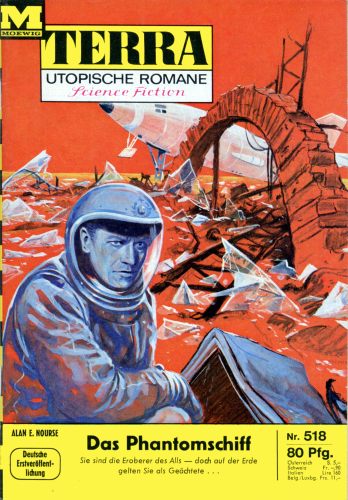

Alan E. Nourse : Das Phantomschiff (Raiders from the Rings)
Terra SF 518/519, 12.05.1967
Deutsche Erstausgabe
Originalausgabe 1962
Aus dem Amerikanischen von Birgit Ress-Bohusch
Titelbilder : Karl Stephan
The Raiders could hear the mauki’s chant from the moment they boarded the ship from Earth.Aus dem Prolog
It came from somewhere deep in the heart of the craft, and they paused as soon as the outer hatchway had been forced, listening in spite of themselves in the darkness of the corridor. It came to them softly at first: a clear, sweet woman’s voice, sharp as crystal in their ears. Then it rose higher, mournful and shattering, and the words became distinct in the ancient, heart-rending lament that the raiders had heard so many times before. Urgent as their mission was, they could not help but listen for a moment, feeling the wave of sadness and longing surging up in their throats.
Beyond them the ship’s corridor was empty; there was no sound here other than the chant. Not even the throbbing of the ship’s generators was audible in the blackness. The raiders stood transfixed for a moment. Then Petro, the leader, took a deep breath and flicked on the battle lantern at his belt.
“She’s here, all right,” he said. “She must have the whole crew listening. Let’s go.”
The three men moved down the corridor, flashing their lights cautiously. Petro pointed to an overhead conduit. “Jack, that must be the main power cable. Follow it down to the generators, and wait for the word. Tiny, you come with me. And be careful. We can’t assume that everybody’s listening to the woman.”
Silently they moved along to a corridor crossing, then ducked down a ladder into a storage hold. It had been ridiculously simple to break into this huge, clumsy ship from Earth. From the first fleeting contact a week before, the raiders had been stalking it, watching with contempt as it moved ponderously on its way through the Asteroid Belt, unaware that it had even been spotted. Finally it moved into the shadow of a huge chunk of asteroid debris and waited, obviously depending on its radar screens to pick up any approaching vessel. With the clumsiness so typical of Earthborn men in space, the crew of the Earth ship had overlooked the fact that the asteroid they were using for concealment was blinding them completely
on one side. It was then that the Spacer ship had moved in on its prey.
Now the raiders were aboard, and the mauki was doing her part. Petro and Tiny worked their way through the pitch-black holds into the galley and down toward the brig area. They were big, powerful men but they moved like jungle cats in the darkness. Not once did they encounter one of the Earth crewmen. When they finally approached the brightly lighted mess hall just above the brig area, they saw the reason why.
The crew were listening to the mauki. The mess hall was crowded with men; still others were jamming the approach corridors and ladders down to the woman’s cell. Some smoked, some munched slowly on the remnants of dinner, shifting to new positions for comfort, but all of them were listening intently to the haunting measures of the chant, like men in a dream from which they could not escape.
In her tiny cell in the brig, the mauki stood gripping the bars, a tall, straight, proud woman, filling her lungs and throwing her head back as she sang. Entranced, her captors had become captives, straining to hear her, drawn from all quarters of the ship, leaving their work to come closer as the chant struck home. Petro winked at his companion, and ducked down a side corridor leading to the brig area. “She’s got them hooked, all right,” he said. “The child must
be in there with her. Got the cutting torch ready?”
“Yes. But I don’t see the kid.”
Petro clicked on a handset. “Ready, Jack?”
“All set.”
“Then let it blow.”
Ein Jugendbuch von Alan E. Nourse, das - soweit ich das US-amerikanischen Kommentaren entnehmen kann - wohl bei den Kindern damals gut ankam. Als die Männer und Frauen der Erdsateliten sich weigerten, die auf den Satelliten stationierten Waffen im Krieg einzusetzen, wurden sie ausgestoßen und es entbrannte ein Konflikt zwischen den Erdbewohnern und den Raidern, die Mars und Astereoiden bewohnbar gemacht haben. Durch einen strahlungsinduzierten Gendefekt können sie nur männliche Nachkommen zeugen, so daß sie zur Fortplanzung auf das Kidnapping von Erdfrauen angewiesen sind ...
Und ja, die Geschichte liest sich genauso altbacken, wie der geneigte Leser jetzt befürchtet. Da wird praktisch kein Fettnapf ausgelassen, inklusive der Weisen Alten Außerirdischen, die die Menschheit retten wollen. Wirklich kein Roman, den man unbedingt gelesen haben muß. Ich war auch nach den ersten dreißig Seiten absolut irritiert, denn den Plot hätte ich eher in die 30er und 40er verortet. Der Roman ist tatsächlich aber erst 1962 erschienen. Allerdings ist "Raiders from the Rings" ein Fixup, der Roman basiert auf der 1951 erschienenen Geschichte "Song of the Mauki" von J. A. Meyer, einem langjährigem Co-Autor von Alan E. Nourse.
Insgesamt also eher etwas für Kinder als für den erwachseneren SF-Leser.
Keine Kommentare:
Kommentar veröffentlichen